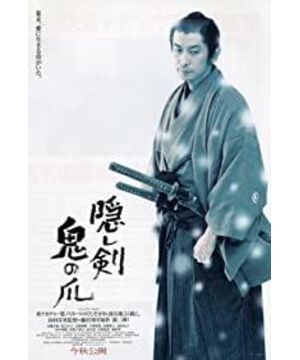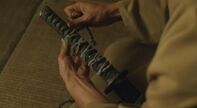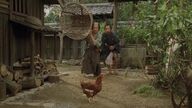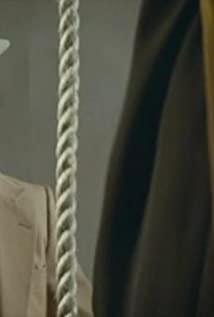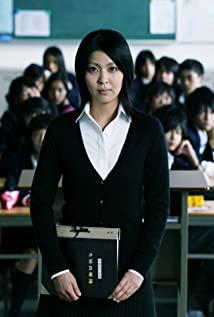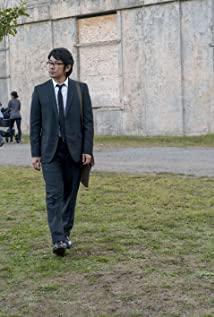in Japanese Tradition It is not difficult to find two contradictory extremes in Japanese literature. The beauty is always ruined, ugly and dilapidated. Just like their national flower, cherry blossoms, whenever the cherry blossoms decay and fall, it is the best time for people from all over the country to go out to watch the cherry blossoms. This is a special combination of sadness and romance, incompleteness and perfection. Kawabata Yasunari has always pursued the beauty of "sorrow" in his works. In his eyes, this beauty is natural because "the word "sorrow" in Japanese is similar to beauty" ("The Beauty of Immortality"). The first time I watched Kawabata Yasunari's "Sleeping Beauty", the most impressive thing is that the 67-year-old Eguchi old man carefully held the young girl's hand, as if she was a butterfly and was about to fly away at any time. In the room, the decayed smell of the loose skin of the old man and the fragrance of the sleeping girl mixed into a strange picture. Through her pink and tender earlobes, smooth and slender skin, and fresh and rosy blood, he greedily tried to catch the long-lost figure of youth. Such sight and beauty are only a small part of the contradictory character of the Japanese.
Ruth Benedict, an American anthropologist who studies Japan, wrote in the opening chapter of "Chrysanthemum and Sword": "Japanese people’s temperament and behavior are extremely contradictory. They are both aggressive and gentle; they both admire The pursuit of force and beauty; both self-respect and humble and polite; both stubborn and weak and fickle..." Similarly, the Chinese people always hold a complex and changeable mentality when they look at Japan. The history of aggression has brought inconsistency. Hatred, and their arrogant attitude is inseparable from their traditional hierarchical culture. Of course, these are not what Yamada Yoji wants to express in the movie "Hidden Sword and Ghost Claw", nor is it the center of this article. Hatred and bad history cannot erase those achievements in movies and literature. People still love Takakura Ken, Miyazaki Hayao, and Kurosawa Akira. This is a rare tolerance.
Judging from the fact that the Japanese have been training their will in thin clothes in the snow since they were young, it is not difficult to find that they are a nation whose spirit is higher than material. This way of enduring hunger and cold, almost destroying the body, seemed to them indispensable, the realm they pursued all their lives. The Bushido spirit has always existed as a model of Japanese morality and has never died out. From people's view of the samurai spirit to the image of samurai in today's film works, we can see the changes in Japanese history and the changes in people's thinking.
In Japan's feudal society, under the emperor and court nobles, there were four stratums: Shi (samurai), agriculture, industry, business, and the most untouchables. In the Tokugawa shogunate era after the war subsided, Toyotomi Hideyoshi's "sword payment order" gave the samurai privileges. Only they had the right to sabers, and they did not have to work to receive their salary on time. In the decree issued, samurai were especially given the right to "kill the common people who were unreasonable to them."
Bushido was originally the "Warrior's precepts", and there is no written treatise. It is passed down through the precepts of the older generations. It is inevitable that it is also mixed with the understanding of the samurai itself. In many movies, you can see the great influence of fathers on sons. Many samurai's initial understanding of life and death and honor comes from the mouth of fathers. In "Hidden Sword and Ghost Claws", Katagiri Zongzo has always remembered his father's teachings, and the scene of his father's suicide by amputating his belly in honor of honour is always lingering in his mind.
In the book "Bushido", a thinker who has studied in the United States and Germany, Nito Hudaozao talked about several parts of the Bushido spirit: righteousness, courage, benevolence (compassion), courtesy, sincerity, reputation, and loyalty. Among them, "righteousness" is the most important teaching in the guidelines. The famous warrior Lin Ziping once defined "righteousness" in this way, "righteousness is a brave opponent, a decisive heart. That is to say, a will that is determined without hesitation based on reason. If you should die, you should die and you should attack. Attack on the occasion.”
To discuss the three points of justice, bravery, and benevolence alone, the Katagiri Suzura in "Hidden Sword and Ghost Claw" is a very good samurai, but he broke the traditional spirit of many samurai. He is no longer an obedient puppet next to a lord, a king, or a loyal assassination tool. The choices he makes in the face of contradictions such as loyalty and justice have a higher sense of humanity. His existence is like the melting of new snow, and the buds showing on the branches, as if waiting for a free and beautiful spring.
[Japan is a nation whose spirit is higher than material]
2. Japan in "Hidden Sword and Ghost Claw"
At the end of the Tokugawa Shogunate, the currency economy era made the merchant class richer and richer. They are no longer content with their current status, they try their best to ascend to the upper class, and gradually get closer to the warrior class. The prolonged era of peace, the heyday of swordsmanship, which kept the samurai away, gradually declined. The intermarriage and integration with the merchant class allowed the samurai to have more exposure to advanced Western technology. Many samurai with territories and rights used their skillful political skills to open up their own world.
Even Xiaofan in remote areas has felt the changes in society. The samurai had to put down the katana that their ancestors had hung around their waists for generations, and became accustomed to the smell of gunpowder from Western artillery. Katagiri Muzura is one of the samurai who feels the change. His family was a traditional samurai home that accepted the feudal lord's salaries. As his father committed suicide with hatred, his salary was greatly reduced, and his life fell into a dilemma.
1. Katagiri Suzura's Samurai Love
Katagiri is a person with a typical "Samurai Love". The so-called "the most fortitude is the most gentle person" can not be more appropriate to describe him. Regardless of the common people or the untouchables, he is very respectful, never being domineering or arrogant because he is a samurai, and even upset because his ferocious and serious appearance scares people. This seems to be inseparable from his family education. Katagiri's mother treated her subordinate silk as caring as her own daughter, never beating or scolding, and taught her etiquette, housework, and poetry reading. Attendants at home are free to express their opinions at home without worrying about the master.
However, Katagiri's benevolence and gentleness are not blind, but are based on justice and conscience. This is very different from the previous concept of samurai. As the samurai lives on the monarch’s salary, they have nothing to do except to protect the safety of the lord. They almost become a samurai sword that has been tempered and tempered but has no thoughts. When it comes to this kind of loyalty, the most cited in Japanese education is the "Forty-seven Righteous Akaho". They did not hesitate to abandon their wives, abandon their children, kill their fathers, and violate national laws in order to avenge the lord Asano Nagasaki. After successfully avenging his master, all of them committed suicide by amputating their abdomen. Although Katagiri is not an ambitious person who wants to overthrow the monarch, he is definitely not a person who obeys the monarch wholeheartedly.
In a painting titled "Expelled Samurai", a samurai knelt on the ground to accept the scolding of the lord. He held back his anger and gripped the hilt of the sword. The samurai who offended the lord will be expelled and lose all support for life. Samurai regards calmness and restraint as a realm of cultivation. Therefore, Katagiri seldom showed emotions from beginning to end, and sometimes even had a numb expression, and he could only see his joy and anger in his eyes. When facing the faint lord, his tolerance is a kind of dissatisfaction, like a full bow, but without a sword. The restraint in the face of the girl she likes is a kind of helplessness.
2. Love between different classes
"I think of the monarch in the morning, and I think of the monarch in the hunt. Zimu bows and the sound enters the heart of the concubine."
In the famous samurai movie "Seven Samurai", Kurosawa Akira describes it A love that never ends between the samurai and the peasant daughter. The gap between classes makes love seem more like eroticism, small and perishable, too many constraints are blocking love. Free choice of love is a fantasy in that era of red tape. Even today, marriages in many Japanese families still have to obey the orders of their parents and cannot make claims.
Director Yoji Yamada unexpectedly shows a love that transcends class and the times in the film.
Suen is a poor peasant girl, and she started working at Katagiri's house when she was sixteen. She is like a plum blossom covered in fine snow, and it can bloom with a crystal clear fragrance even in the harshest environment. As a samurai, Katagiri can suppress this sincere feeling, but as a man, he can't resist the deviation of his heart. Silk is his candlelight in the dark, and it is precious in this weary society full of power struggles.
When silk was married, she turned off the last light in the house. Spring came very late that year, and the dull and cold winter seemed to have no end. When we met again, Katagiri's haggard and thin silk ignited the flames in Katagiri's heart again. He thought that Jian was happy, because anyone would take good care of this kind girl, but the treacherous businessman just used her as a lowly subordinate. The exhausted Jian eventually became seriously ill and no one could heal him, so he could only lie down. Waiting for death in the dark corner.
After knowing about it, Sectura Katagiri broke into the merchant's house anxiously without hesitation for a moment. Shun's mother-in-law's cold refusal and angrily threatened, only in exchange for his angry sentence: "When necessary, I will use my sword to protect Shun!" He carried the dying silk on his back, and was furious, and ordered the coming husband to write. Dismissal. From today onwards, silk will be hidden with Katagiri-zong, and his silk will be worthy of any family!
Although Katagiri really didn't know anything about life except for wielding a sword, he didn't even know how to cook porridge, but when Kan was sick, he took care of her every step of the way. Silk's smile is comparable to the sun that was born in the morning of spring, which is more precious than anything. He once couldn't conceal the joy in his heart and said to others, "Look, Jian laughed!", as if he had discovered a rare treasure. He also murmured a bit because of the joke that Jian said that he was afraid of the samurai, "And now here, my heart is beating for Jian." This is the most touching confession in the world, but I am afraid that the dumb Katagiri himself will hardly notice it.
In the end, under the crabapple tree in early spring, he gave up his samurai status, and said nonsense that didn't matter for a long time. Looking into the distance, he said to the silk who was already sluggish with ecstasy: "I love you. I have fallen in love with you since the first time I saw you." This is a man who is too "insincere", but he can't hide it in the end. Live your heart.
This sincere love is the best memory of that era.
[Silk is a plum blossom blooming in the cold winter]
3. Samurai swords
Samurai usually start to practice how to use swords when they are very young. By the age of 15, they can have a knife of their own, which means that he is already a real samurai. The knife is not a decoration, but a responsibility, a symbol of loyalty and honor. The samurai's sword is like the most loyal companion, not leaving the body for a moment. A good sword has a soul, it will protect the samurai, and when the scabbard is drawn out, it will send out a deterrent force to the opponent.
In the 1962 samurai movie "Tsubaki Sanjuro", there is a theme throughout the film: the best sword is in the scabbard. Katagiri Suzura also said that samurai swords are rarely unsheathed unless they have to. The killing is terrible even for the samurai. Even in the harshest period of war in Japanese history, killing has become a part of daily life. The authoritarian Earl Katsukai Chou can still say with a clear conscience: "I hate killing. I have never killed a person."
The Bushido spirit also advocates "wielding a sword at the right time", and people who abuse katana are regarded as cowards. It's a pity that there are very few samurai who follow this rule, and sometimes they even kill innocent people in order to try their swords. In fact, not only the samurai, there are also many heroic cowboy images in American Western films that are murderous. So Clint Eastwood filmed "Unforgiven" in his twilight years, to commemorate the decline of western movies, and second to reflect on the spirit of the Western movies that used murder as a sign of being cool. In the movie, humanity is re-evoked. The liberated Mrs. Tsubakiru in "Tsubaki Sanjiro" said earnestly to his benefactor Tsubakiro, "It's good for you to save me, but you can't kill people to save others." In the eyes of his wife, no matter how good his sword and martial arts were, Tsubaki-san was just a second-rate samurai like an unsheathed hand-to-hand sword. Will only die by the knife.
However, Shiro Hazama clearly surpassed Katagiri Zongzo in martial arts, but he was still repeatedly defeated by Katagiri. It is not because he is not fast enough or ruthless enough, but because he is not right in his mind and is too eager to win. On the contrary, he is easy to fall into the trap of his opponent. Victory is often between the cut he could not predict.
4. Hidden sword and ghost claw
"The size of bravery is not divided between one enemy and ten thousand enemies, but whether it is righteous or not. The act of a righteous chivalrous man is courageous even if one is a man; the teacher of unrighteousness is only a brave man in the whole country. "-"Mencius • King Lianghui"
self-denial is a compulsory course for warriors, they must achieve "thunder in the chest, but face as flat as a lake". But it is precisely because as a samurai, Katagiri Zongzura thinks that some things cannot be tolerated. So he assassinated his lord and helped justice. Although the hidden sword was used by ninjas for assassination, it was not used among samurai. But the spirit of Katagiri Suzura belongs to the samurai.
When talking about courage, Shindo Inazou said: "Courage is almost worthless in morals unless it is for righteousness.
" At the end of "Tsubaki Sanhiro", Tsubaki Saniro's sword lightly crosses the other. A samurai's chest, the blood on the samurai's chest seemed to be frozen by time and burst out like a sudden liberation. That shocking scene became a classic scene in movie history. And in the script of "Tsubaki Sanjuro" it is written like this: "The duel of two men cannot be described in words. After a long, frightening pause. The result was determined by a simple sword." Kurosawa Ming's brilliance lies in his control of time and vision. Time always seems to be half a beat slow, highlighting the speed of Tsubaki Sanhiro's sword. The visual effect is beyond the normal physiological phenomenon, but no one thinks it is false. This kind of beyond image just makes up for the lack of time and pace, creating a perfect scene.
The climax of "Hidden Sword Ghost Claw" was when Katagiri Suzura assassinated the lord. The long and narrow corridor is dimly backlit, and the lens is always peeping at everything from a distance. Katagiri Suzura quickly walked over to the lord while he was alone, knelt down, and said nothing to the lord's questioning. Suddenly Katagiri stood up slightly and looked over the wall on the right, and the lord could not help but look towards the wall with his gaze. Time also stopped on the wall with Katagiri's gaze. He turned around and raised his arm to the lord's chest and waved it lightly, like a silent ghost claw, then immediately lifted his clothes and walked out of the corridor. Time seemed to flow again after he left. The lord did not notice any discomfort, turned around and continued walking, but suddenly fell to the ground and died. The drums outside the house were still beating rhythmically, and the attendants walked back and forth at the end of the corridor several times before they realized the feudal lord was strange. This dead silence before and after the assassination, the invisible sense of suffocation like a ghost claw, creates another visual shock. Contrary to the outburst of "Tsubaki Jiro", he was already dead before that terrifying pause. I think this is what Kurosawa said, "One action is very magnificent."
Katagiri Suzura killed only one feudal lord from beginning to end, but because he obeyed his conscience for justice, broke the stale loyalty, it was of great significance. This is the so-called "great bravery".
Three, samurai movie
Akira Kurosawa represents the peak era of samurai movies. He once said: "A good movie must be interesting and easy to understand." When creating "Seven Samurai", he just hugged and made a good-looking entertainment film. The attitude of shooting. Creation is pleasant for him, and he also incorporates this pleasure into the movie. As a result, we saw the forbearing and serious image of Kikuchiyo, played by Toshiro Mifune, jumping up and down in front of the camera. He has no martial arts, but has the ability to amuse people-for a while, he touches the river bare buttocks in front of a group of people. After a while, Yu climbed on the horse's back willfully but was thrown off. He didn't give up yet, clutching his sore butt and chasing the horse. The seven samurai seldom communicated with each other in courtesy and numbers, always teasing and playing with each other, subverting the samurai tradition. The seven ronin warriors became the true warriors that people chanted. Because in that era when everyone was fighting for their own ambitions, only they were not fighting for selfish desires, fighting for the protection of others.
In recent years, samurai movies have gradually become uninterested. In 2002, Yamada Yoji brought the image of a samurai back to the screen with a "Twilight Seihei", and his "Trilogy of Fallen Samurai" followed with it. Yoji Yamada, who is good at making comedies, added humorous scenes to the movie, and naturally there is no trace. In "Hidden Sword and Ghost Claw", he asked a group of usually unsmiling warriors to catch chickens all over the yard with two broomsticks, and finally was embarrassed by a little hen. This situation is definitely unexpected and makes people laugh, and the aftertaste is deep. This kind of humor can be seen everywhere in the movie, which makes the movie very warm and full of human touch.
Unfortunately, not every director has the ability to incorporate comedy elements into the movie, and if they are imposed, it will be self-defeating. The 2006 "Flower Dancer" is an example of failure. Although the director also invited some actors from the Yamada Yoji Samurai trilogy, the deliberately boring jokes, pale characters and unconvincing performances made the story unglamorous, and the trivial details made the movie even more interesting. Tossed up. A good story against "Samurai Revenge" was wasted.
In contrast, Yamada Yoji's interpretation of the samurai spirit in "Hidden Sword and Ghost Claw" is even more rare. It can be seen that the samurai movie has a new understanding of the spirit of the samurai since Kurosawa Akira. Although it cannot be said that Yamada's works represent another peak of samurai movies, or reach the height of Akira Kurosawa, it can be seen that his different understanding of the spirit of the samurai has given the samurai a more modern spirit of freedom.
Please indicate the author: Nine-Tailed Black Cat
http://www.mtime.com/my/LadyInSatin/blog/769891/
View more about The Hidden Blade reviews


